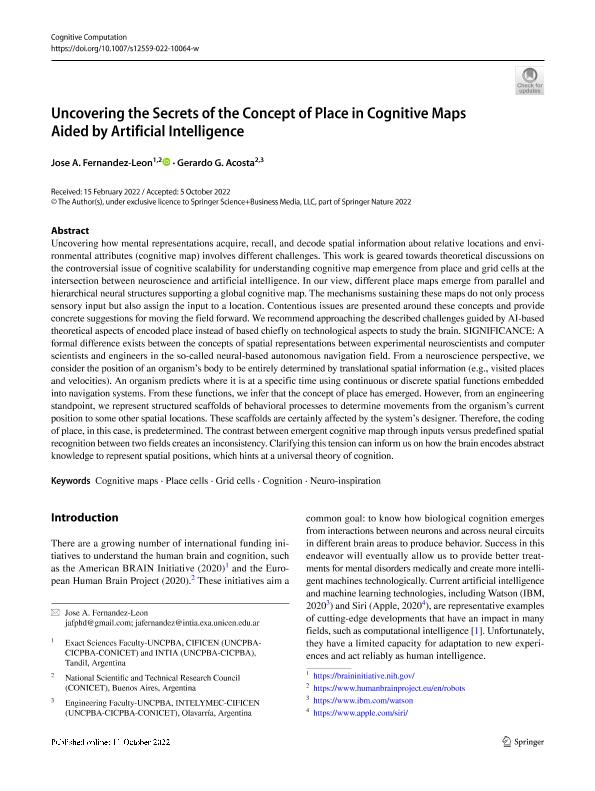Mostrar el registro sencillo del ítem
dc.contributor.author
Fernandez Leon, Jose Alberto

dc.contributor.author
Acosta, Gerardo Gabriel

dc.date.available
2023-10-02T12:42:07Z
dc.date.issued
2022-10
dc.identifier.citation
Fernandez Leon, Jose Alberto; Acosta, Gerardo Gabriel; Uncovering the Secrets of the Concept of Place in Cognitive Maps Aided by Artificial Intelligence; Springer; Cognitive Computation; 10-2022; 1-11
dc.identifier.issn
1866-9956
dc.identifier.uri
http://hdl.handle.net/11336/213714
dc.description.abstract
Uncovering how mental representations acquire, recall, and decode spatial information about relative locations and environmental attributes (cognitive map) involves different challenges. This work is geared towards theoretical discussions on the controversial issue of cognitive scalability for understanding cognitive map emergence from place and grid cells at the intersection between neuroscience and artificial intelligence. In our view, different place maps emerge from parallel and hierarchical neural structures supporting a global cognitive map. The mechanisms sustaining these maps do not only process sensory input but also assign the input to a location. Contentious issues are presented around these concepts and provide concrete suggestions for moving the field forward. We recommend approaching the described challenges guided by AI-based theoretical aspects of encoded place instead of based chiefly on technological aspects to study the brain. SIGNIFICANCE: A formal difference exists between the concepts of spatial representations between experimental neuroscientists and computer scientists and engineers in the so-called neural-based autonomous navigation field. From a neuroscience perspective, we consider the position of an organism’s body to be entirely determined by translational spatial information (e.g., visited places and velocities). An organism predicts where it is at a specific time using continuous or discrete spatial functions embedded into navigation systems. From these functions, we infer that the concept of place has emerged. However, from an engineering standpoint, we represent structured scaffolds of behavioral processes to determine movements from the organism’s current position to some other spatial locations. These scaffolds are certainly affected by the system’s designer. Therefore, the coding of place, in this case, is predetermined. The contrast between emergent cognitive map through inputs versus predefined spatial recognition between two fields creates an inconsistency. Clarifying this tension can inform us on how the brain encodes abstract knowledge to represent spatial positions, which hints at a universal theory of cognition.
dc.format
application/pdf
dc.language.iso
eng
dc.publisher
Springer

dc.rights
info:eu-repo/semantics/openAccess
dc.rights.uri
https://creativecommons.org/licenses/by-nc-sa/2.5/ar/
dc.subject
COGNITION
dc.subject
COGNITIVE MAPS
dc.subject
GRID CELLS
dc.subject
NEURO-INSPIRATION
dc.subject
PLACE CELLS
dc.subject.classification
Otras Ciencias de la Computación e Información

dc.subject.classification
Ciencias de la Computación e Información

dc.subject.classification
CIENCIAS NATURALES Y EXACTAS

dc.title
Uncovering the Secrets of the Concept of Place in Cognitive Maps Aided by Artificial Intelligence
dc.type
info:eu-repo/semantics/article
dc.type
info:ar-repo/semantics/artículo
dc.type
info:eu-repo/semantics/publishedVersion
dc.date.updated
2023-07-07T21:57:23Z
dc.identifier.eissn
1866-9964
dc.journal.pagination
1-11
dc.journal.pais
Estados Unidos

dc.journal.ciudad
New York
dc.description.fil
Fil: Fernandez Leon, Jose Alberto. Universidad Nacional del Centro de la Provincia de Buenos Aires. Centro de Investigaciones en Física e Ingeniería del Centro de la Provincia de Buenos Aires. - Consejo Nacional de Investigaciones Científicas y Técnicas. Centro Científico Tecnológico Conicet - Tandil. Centro de Investigaciones en Física e Ingeniería del Centro de la Provincia de Buenos Aires. - Provincia de Buenos Aires. Gobernación. Comisión de Investigaciones Científicas. Centro de Investigaciones en Física e Ingeniería del Centro de la Provincia de Buenos Aires; Argentina
dc.description.fil
Fil: Acosta, Gerardo Gabriel. Universidad Nacional del Centro de la Provincia de Buenos Aires. Centro de Investigaciones en Física e Ingeniería del Centro de la Provincia de Buenos Aires. - Consejo Nacional de Investigaciones Científicas y Técnicas. Centro Científico Tecnológico Conicet - Tandil. Centro de Investigaciones en Física e Ingeniería del Centro de la Provincia de Buenos Aires. - Provincia de Buenos Aires. Gobernación. Comisión de Investigaciones Científicas. Centro de Investigaciones en Física e Ingeniería del Centro de la Provincia de Buenos Aires; Argentina
dc.journal.title
Cognitive Computation
dc.relation.alternativeid
info:eu-repo/semantics/altIdentifier/doi/http://dx.doi.org/10.1007/s12559-022-10064-w
Archivos asociados
